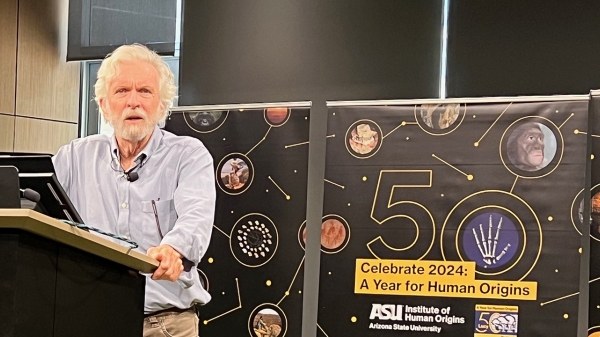Arizona State University has announced its first official charter, a comprehensive document focusing the university’s mission on the inclusion and success of all its students, and on a fundamental social responsibility to the communities ASU serves.
University President Michael M. Crow described the document as an expression of “the reason for the existence of the institution,” and one that re-imagines the role of a major university in the 21st century.
“The culture of a major, research-driven public university in the United States has been inextricably and forever altered to be focused on the success of the student and the success of the community,” Crow said. “Every asset of the individuals at ASU, every ounce of energy that they have, is devoted to those two things.”
The charter, announced in a presentation to the Trustees of ASU, comes 12 years after Crow’s appointment as president of ASU and is an articulation of his vision for the institution.
It defines ASU’s mandate as measuring success “not by whom it excludes, but by whom it includes and how they succeed.”
“There’s no reason to say, ‘well that person can only do that’ or ‘this person can only do this,’” Crow said. “We’re trying to produce a person capable of learning anything.”
The charter, which is 46 words long, also presents a paradigmatic shift in the way a university can act as a force for good in Arizona, the country and the world.
The charter states that ASU will assume “fundamental responsibility for the economic, social, cultural and overall health of the communities it serves,” and that it will focus on “research and discovery of public value.”
Crow said ASU’s efforts to better the community can serve as an example for all of higher education.
“We can make our universities produce master learners more dedicated to the breadth of our society, more dedicated to the betterment of our society, more dedicated to the betterment of our democracy,” he said. “If we can do that, we will have had a major impact on the outcome of humanity.”
John Graham, chairman of the Trustees of ASU, described the charter as an important milestone in ASU’s history.
“Arizona State University is a relatively young institution, still evolving in terms of its goals and structure, but it has an unwavering focus on its core mission,” said Graham. "The establishment of this charter is a critical inflection point in ASU’s evolution as the New American University of the future.”
Over the next six years, ASU will seek to enhance its national reputation in academic quality and impact, and establish itself as global center for interdisciplinary research and development.
According to Crow, the charter is not merely setting a course for the future of ASU, but is in many ways making explicit what the university has already achieved.
“The students being produced at our university, regardless of their family circumstance, are as capable or more capable than the students being produced at any university,” he said.
More University news

ASU faculty member elected to American Academy of Arts and Sciences
Arizona State University Professor Robert Boyd is among those newly elected to the American Academy of Arts and Sciences, one of the oldest learned societies in the United States. Boyd is one of 250…

Outstanding Graduate supports HIV research and prevention programs
Editor’s note: This story is part of a series of profiles of notable spring 2024 graduates. Cameron Decker has always been passionate about helping others, and during the COVID-19 pandemic began…

College of Health Solutions grad and veteran doing it all for his family
By Aidan Hansen Editor’s note: This story is part of a series of profiles of notable spring 2024 graduates. His wife and kids are his “why.” Arizona native and former Marine Sgt. Clayton Alexander…
